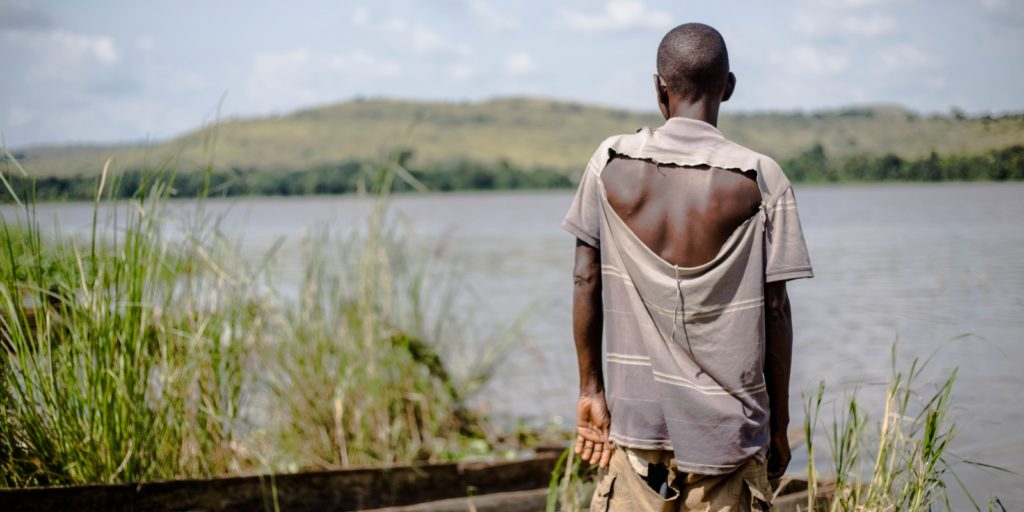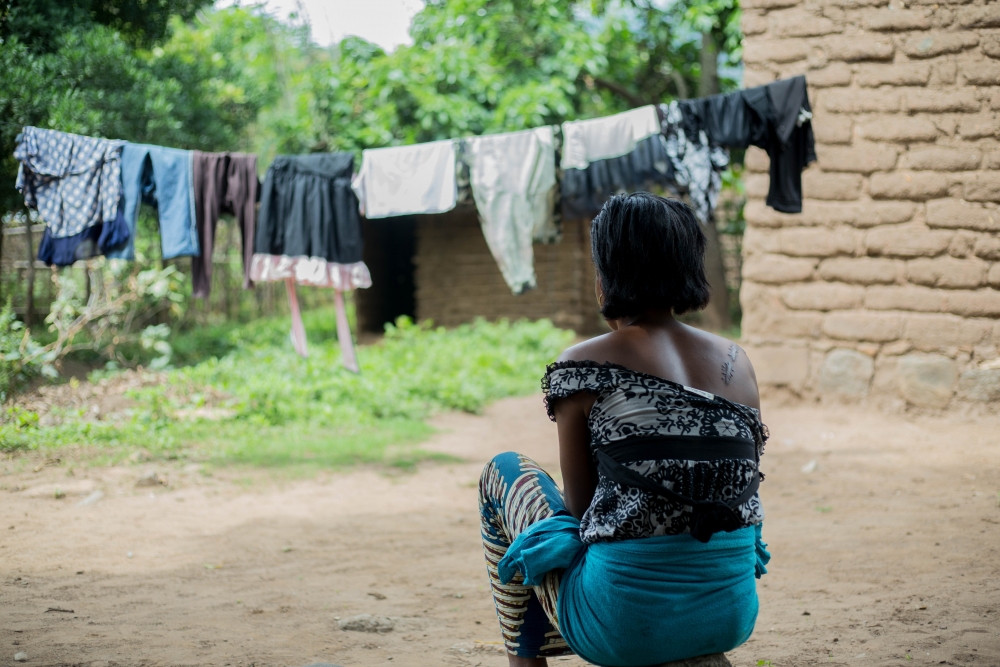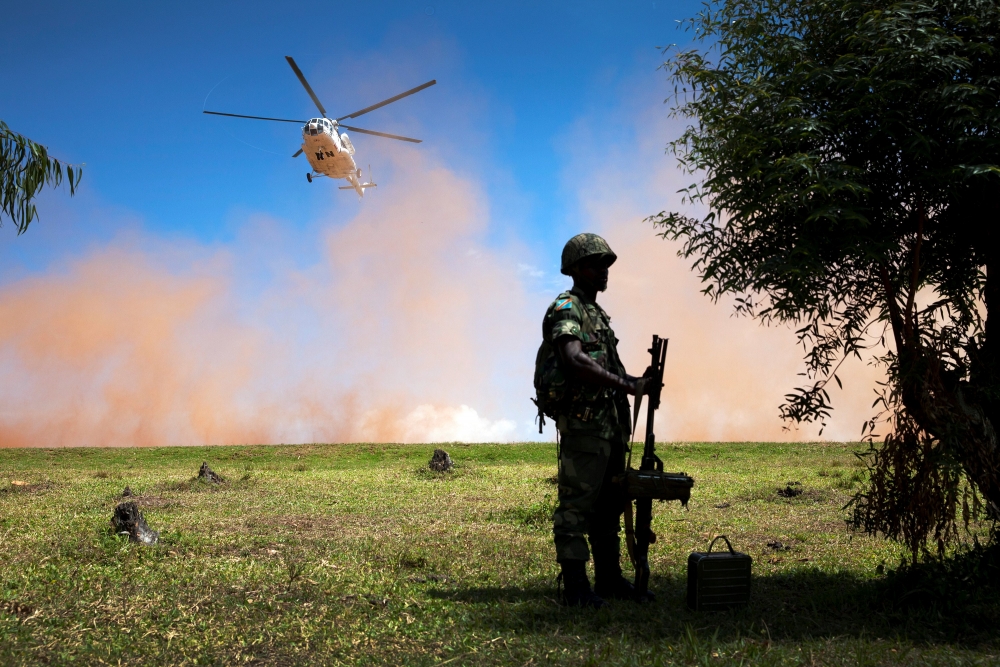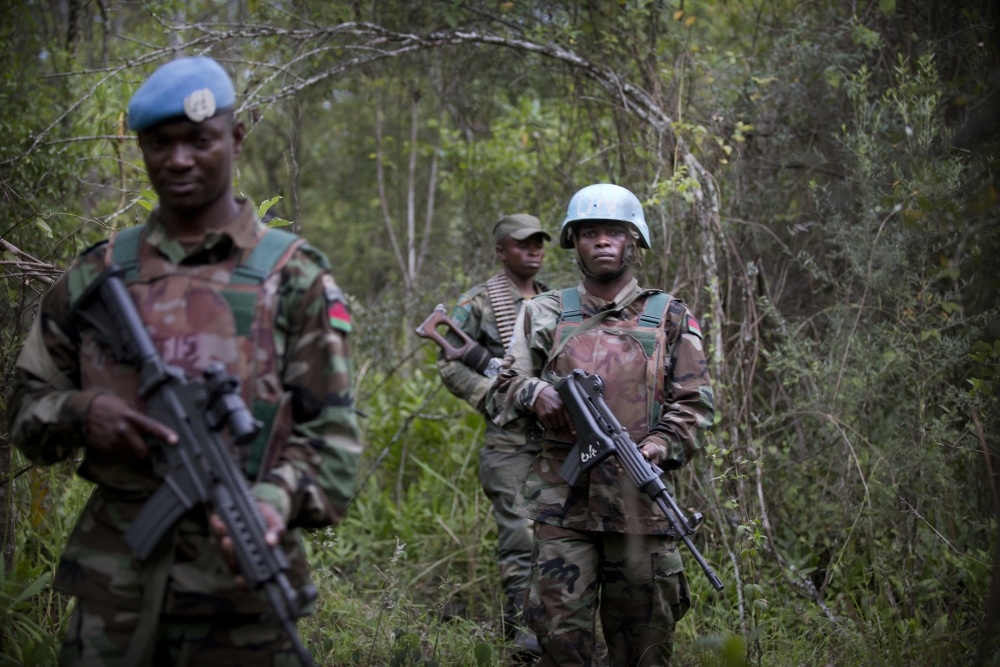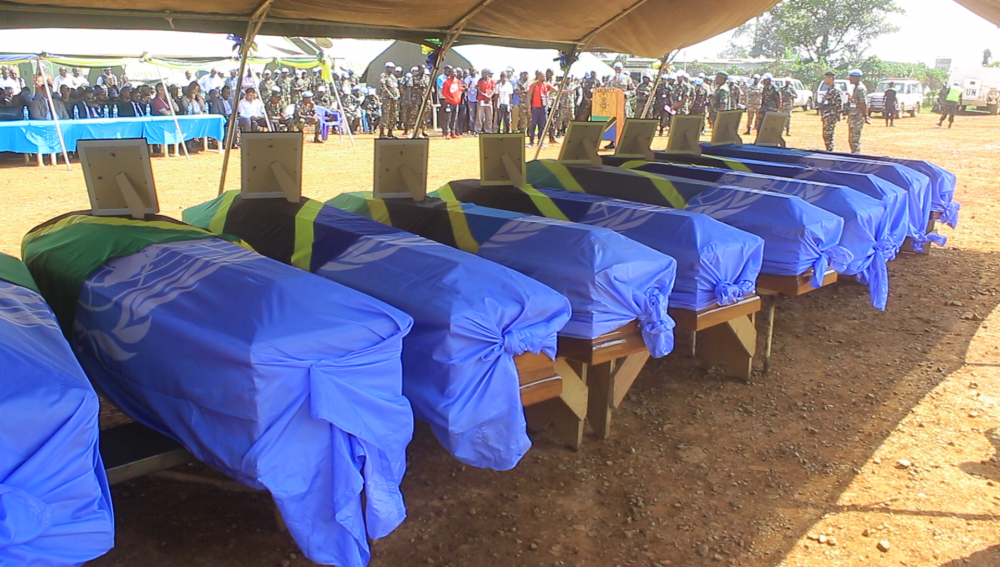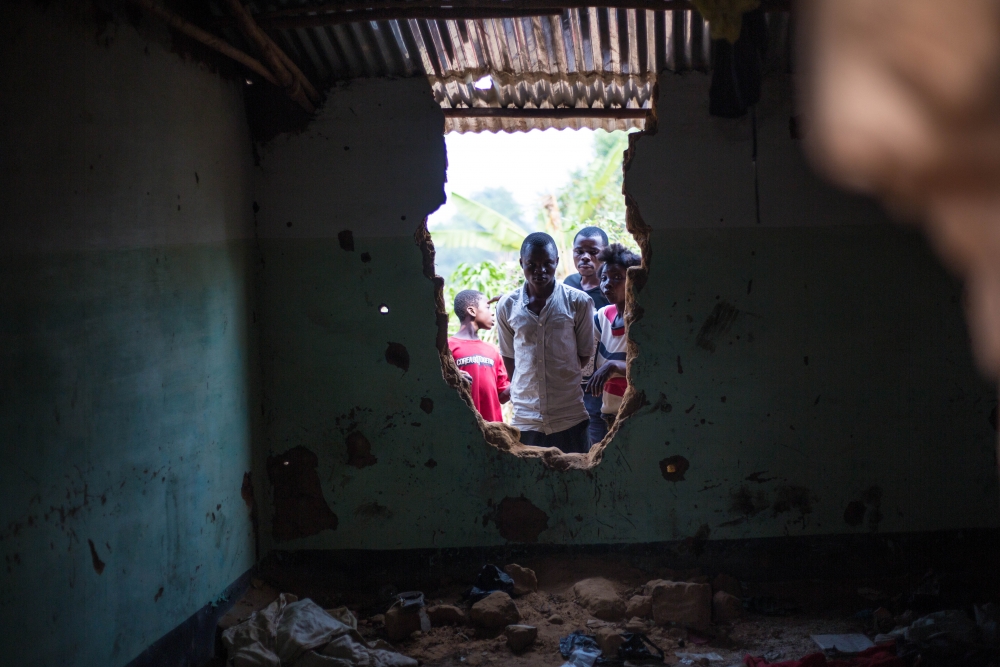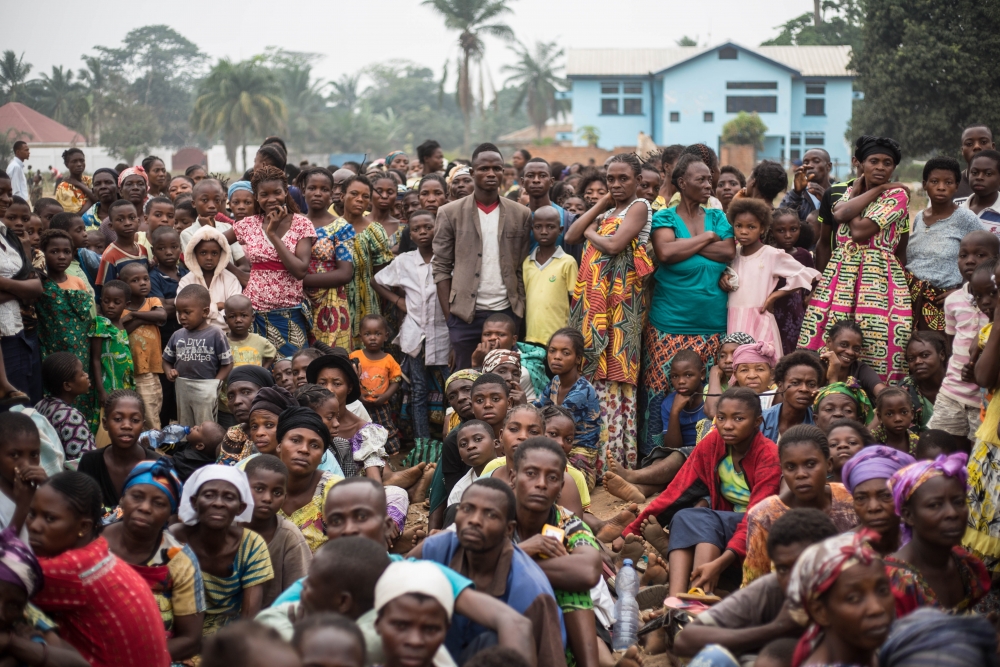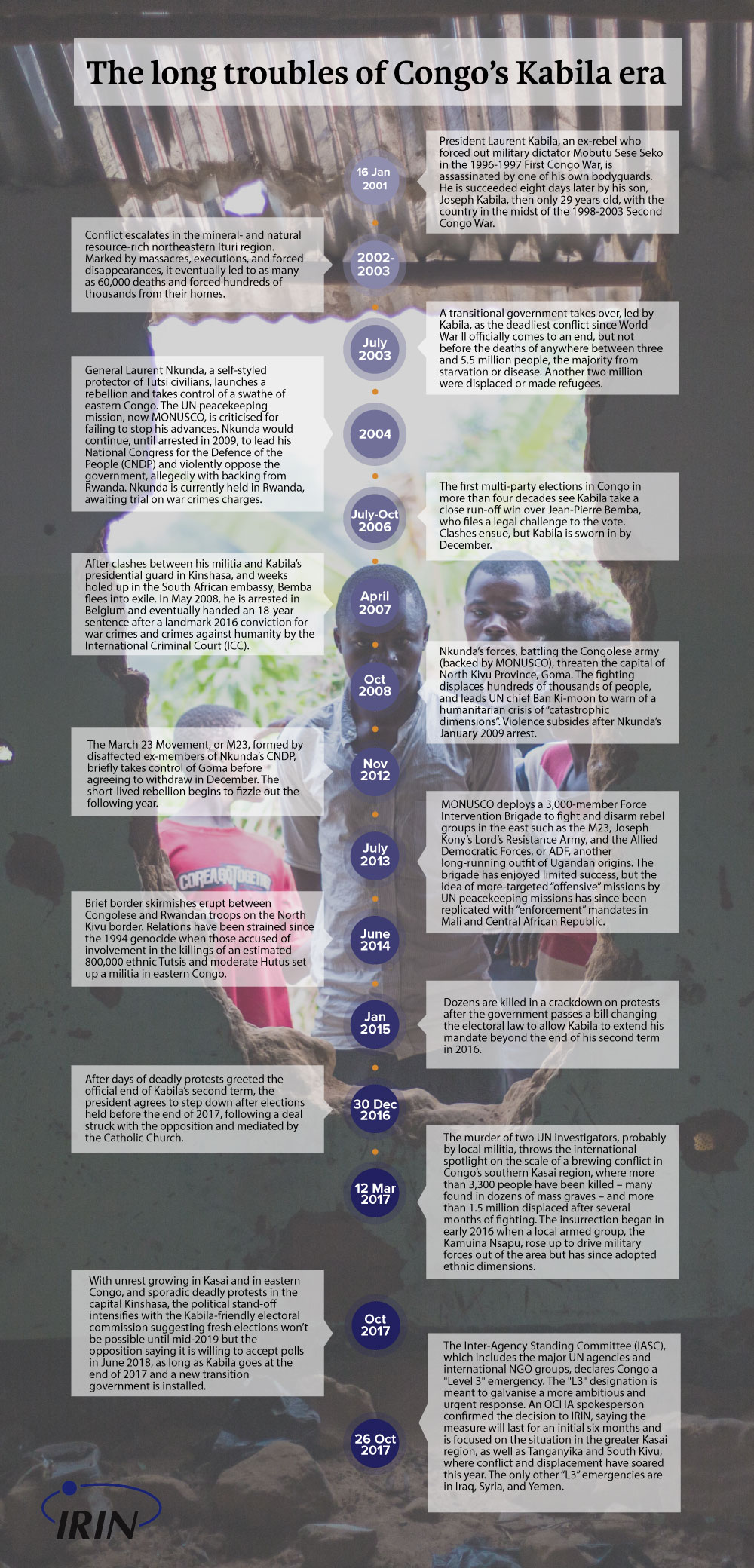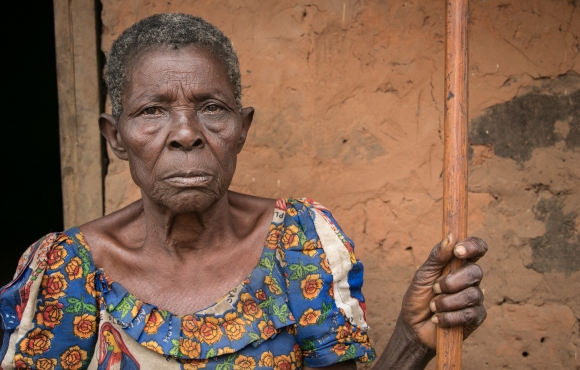Crumbling Congo – The Making of a Humanitarian Emergency
HUMAN RIGHTS, 1 Jan 2018
IRIN – TRANSCEND Media Service
The Democratic Republic of Congo has been at war with itself for more than two decades.
26 Dec 2017 – The immense suffering has reached a new low in the east of the country, where an escalating conflict has triggered a new wave of civilian displacement, food insecurity and human rights abuse.
The scale of the humanitarian crisis requires an urgent international response – but the world is yet to step up to the challenge.
The number of people who do not have enough food to eat has surged by 30 percent this year to 7.7 million. The number of children suffering severe acute malnutrition stands at 1.9 million, exceeding those of Yemen, Somalia, South Sudan and Nigeria combined.
Congo is the country worst affected by conflict displacement – for the second year running. An average of 5,500 people flee their homes every day, bringing the total number of displaced to over four million.
The UN sounded the alarm by declaring the country a Level 3 emergency – the worst-of-the-worst of humanitarian crises. But aid has been extremely slow to arrive for the 13 million people in need. Less than half of the $812 million appeal for 2017 is currently funded.
The provinces of Kivu, Kasai and Tanganyika are the current epicentres of the violence in the country.
In South Kivu, IRIN has documented the rape and sexual violence committed by government soldiers since September as it cracks down on a new rebel alliance – the National People’s Coalition for the Sovereignty of the Congo.
Victims and witnesses provided IRIN with dozens of horrifying first-hand accounts of the sexual violence committed by the national army, the FARDC, which is forcing communities to flee, and building support for the insurgency.
EXCLUSIVE: Inside the Congolese army’s campaign of rape and looting in South Kivu
The CNPSC is one of three Mai-Mai coalitions that have recently emerged in eastern Congo. Their rebellion is against President Joseph Kabila, who refused to step down and hold elections last year when his constitutionally mandated two-term limit expired.
The government has tried to play down the extent of the crisis, but it is clear that resistance is building, with the national army suffering a series of military setbacks.
Rebellion fears grow in eastern Congo
The violence has also extended to include attacks on the UN mission known as MONUSCO – underlining the deadly seriousness of the conflict. In December at least 14 UN peacekeepers were killed and more than 50 wounded when armed men attacked their base Beni, North Kivu. The attack, and the wider insecurity, is likely to have a major impact on humanitarian operations.
What one of the deadliest ever attacks on UN peacekeepers means for Congo
There is a kaleidoscope of armed group in the region that prey on civilians. The FARDC is known to work alongside some of them – including the shadowy Allied Democratic Forces, initially blamed for the attack on the MONUSCO base. Much of the FARDC’s rank-and-file is made up of poorly trained and ill-paid former members of armed groups recruited as part of disarmament and reintegration programmes. The lines between armed groups and outright banditry is extremely blurred.
UN base attack ramps up security fears for vulnerable civilians in eastern Congo
The once-stable Kasai region is now dotted with mass graves. The conflict here pits the Kamuina Nsapu movement against the government in Kinshasa, and both sides are accused of human rights violations. As in the Kivus, the Kamuina Nsapu insurgency has grown in opposition to Kabila’s refusal to surrender power.
Mass graves, missing bodies, and mysticism: Inside Congo’s spiralling Kasai conflict
After 16 years at the helm, Kabila was supposed to hold elections and leave office last year when his second and – under the constitution – final term expired. Instead, he stayed put.
Can Kabila survive? The threat to the government posed by Kamuina Nsapu and the other rebel movements is unproven. Regional players like Rwanda and Uganda appear to be sitting this conflict out, although there are suggestions that Angola is growing impatient with the level of unrest that is sending refugees fleeing into the country.
Kabila’s hold on power rests largely on a demoralized, badly paid and poorly trained army. As the violence intensifies, their loyalty will be put further to the test.
Kabila sits tight as Congo crumbles
Briefing: The conflict in Kasai, DRC ~ 31 July 2017-How a local dispute spiralled out of control in the south of the Congo.
________________________________________________
 IRIN delivers unique, authoritative and independent reporting from the frontlines of crises to inspire and produce a more effective humanitarian response. After 19 years of award-winning humanitarian news and analysis, IRIN, originally the “Integrated Regional Information Networks“, left the United Nations in January 2015 to relaunch as an independent, non-profit media venture. We have been providing ground reporting on humanitarian crises in a way nearly no other institution does. Outside the UN, we are even better positioned to play this critical role, drawing on the expertise, networks and credibility we have developed, and combining them with increased reach, a more innovative approach and a sharper voice.
IRIN delivers unique, authoritative and independent reporting from the frontlines of crises to inspire and produce a more effective humanitarian response. After 19 years of award-winning humanitarian news and analysis, IRIN, originally the “Integrated Regional Information Networks“, left the United Nations in January 2015 to relaunch as an independent, non-profit media venture. We have been providing ground reporting on humanitarian crises in a way nearly no other institution does. Outside the UN, we are even better positioned to play this critical role, drawing on the expertise, networks and credibility we have developed, and combining them with increased reach, a more innovative approach and a sharper voice.
DISCLAIMER: The statements, views and opinions expressed in pieces republished here are solely those of the authors and do not necessarily represent those of TMS. In accordance with title 17 U.S.C. section 107, this material is distributed without profit to those who have expressed a prior interest in receiving the included information for research and educational purposes. TMS has no affiliation whatsoever with the originator of this article nor is TMS endorsed or sponsored by the originator. “GO TO ORIGINAL” links are provided as a convenience to our readers and allow for verification of authenticity. However, as originating pages are often updated by their originating host sites, the versions posted may not match the versions our readers view when clicking the “GO TO ORIGINAL” links. This site contains copyrighted material the use of which has not always been specifically authorized by the copyright owner. We are making such material available in our efforts to advance understanding of environmental, political, human rights, economic, democracy, scientific, and social justice issues, etc. We believe this constitutes a ‘fair use’ of any such copyrighted material as provided for in section 107 of the US Copyright Law. In accordance with Title 17 U.S.C. Section 107, the material on this site is distributed without profit to those who have expressed a prior interest in receiving the included information for research and educational purposes. For more information go to: http://www.law.cornell.edu/uscode/17/107.shtml. If you wish to use copyrighted material from this site for purposes of your own that go beyond ‘fair use’, you must obtain permission from the copyright owner.
